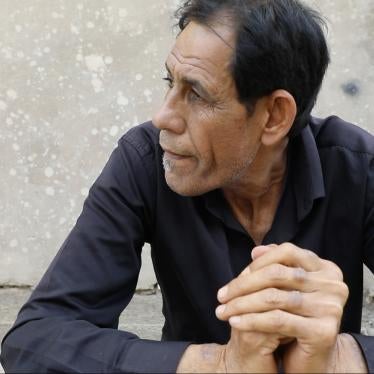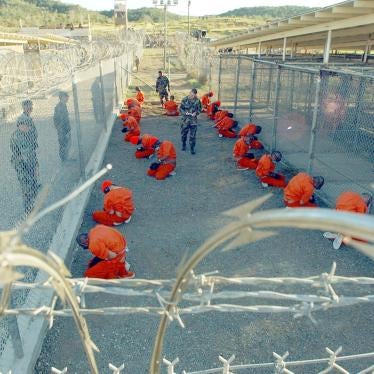(New York) - The trial of a former Guantanamo detainee in US federal court acknowledges the superiority of civilian courts over the discredited military commissions for prosecuting terrorism suspects, Human Rights Watch said today. Opening arguments in the trial of Ahmed Khalfan Ghailani, a Tanzanian citizen charged in connection with the August 1998 bombings of US embassies in Tanzania and Kenya, are set to begin October 4, 2010.
"Trying Ghailani in a US federal court shows deserved respect for civilian courts over the flawed, ad hoc military commissions," said Joanne Mariner, terrorism and counterterrorism director at Human Rights Watch. "Delivering fair and efficient justice in this case sets the stage for the upcoming trial of accused 9/11 mastermind Khalid Sheik Mohammed and four co-defendants."
Human Rights Watch will send trial monitors to observe proceedings in the Ghailani trial, as it has with military commission proceedings and selected federal court trials.
Ghailani, who was arrested in Pakistan in 2004, has pleaded not guilty to charges of involvement in the attacks, which killed 224 people and injured thousands more. Like Khalid Sheik Mohammed and his co-defendants, Ghailani was held for years at a secret Central Intelligence Agency (CIA) "black site" before being transferred to the prison at Guantanamo in 2006. In June 2009, Attorney General Eric Holder ordered that he be moved to the territorial United States and tried in US federal court.
In November 2009, Holder announced that the five defendants in the 9/11 prosecution would be moved from Guantanamo to stand trial in federal district court in New York City, a site of the attacks. Trying alleged terrorists in the federal court system rather than in flawed military commissions is the best way to secure just verdicts and avoid unnecessary appellate challenges to untested military commission rules, Human Rights Watch said.
"The federal court system has been tested over time, while the military commissions are still making things up as they go along," said Mariner.
After New York officials raised objections based on purported security and cost concerns, the Obama administration suspended its decision to move the 9/11 case to federal court. At present, it is unclear where and when the 9/11 trial will be held.
Critics of trying high-level terrorism suspects in federal courts have asserted that the US criminal justice system is not up to the task, citing alleged dangers to US national security that might result from fair and open proceedings. However, past terrorism cases show that federal court rules, including rules set out in the Classified Information Procedures Act, can successfully protect both defendants' due process rights and sensitive national security information, Human Rights Watch said.
Human Rights Watch said it would watch closely the court's use of evidence obtained from Ghailani during the time he was held by the CIA. In pre-trial proceedings in mid-September, defense attorneys objected to the prosecution's attempts to introduce the testimony of a witness whose identity, the defense argued, was obtained during coercive interrogation of Ghailani while in CIA custody. The use of evidence obtained through torture or other ill-treatment violates US obligations under international law and has important implications for the 9/11 prosecution as well as the Ghailani trial, Human Rights Watch said.
During the eight years since the military commissions were first announced, military prosecutors have obtained only four convictions, two of them by plea bargain. The federal courts, in contrast, have tried over 400 terrorism suspects during this period, among them convicted 9/11 conspirator Zacarias Moussaoui and convicted "shoe bomber" Richard Reid.
Ghailani was originally indicted for the embassy bombings in December 1998. A number of his co-defendants, arrested years before him, were tried in federal court in 2001 and sentenced to life in prison without the possibility of parole.
"The original embassy bombings case showcased the strength of the federal court system," said Mariner. "The Ghailani trial can reinforce that point both in the US and abroad."








